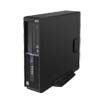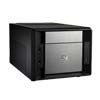Compact workstations are all the rage and this little beauty stands out for its serviceability and storage potential. By Greg Corke
- Intel Xeon E3-1240 v3 CPU (3.4GHz) (four cores, eight threads)
- 8GB (2 x 4GB) DDR3 (1,600MHz) memory
- Nvidia Quadro K600 (1GB DDR3) GPU (331.87 driver)
- 1TB 7,200RPM 6Gb/s SATA HDD
- Lenovo (Intel C226 chipset) motherboard
- 375 x 102 x 338mm
- Microsoft Windows 7 Professional 64-bit
- 3 year onsite warranty
- £899
- lenovo.co.uk
Small Form Factor (SFF) workstations mark a refreshing change from the imposing towers that inhabit most design offices. These often-slender siblings of entry-level desktops are typified by Lenovo’s ThinkStation E32, which is available in both tower and SFF models.
Sitting pretty on the desk is one thing — and Lenovo’s new ThinkStation E32 SFF is a peach — but cramming workstation class components into a tiny chassis does have its drawbacks. The E32 SFF is specifically for entry-level CAD so architects and engineers looking for high-end storage, memory and 3D graphics should look at Lenovo’s ThinkStation C, S or D series instead.
While the E32 SFF is a perfect partner for 2D CAD (in the US Lenovo bundles the machine with a 60-day free trial of AutoCAD LT), one should not assume it is not a serious 3D CAD machine. Its Nvidia Quadro K600 graphics card might not have the grunt of its bigger brother, the Quadro K2000, but it still offers plenty for small- to medium-sized CAD modelling.
The machine’s compact chassis means it can only accommodate a low profile Quadro K600, but the CPU options are identical to the standard E32 tower. And there are plenty of them — from fourth gen Intel Core i3, i5 and i7 to third gen Intel Xeon E3-1200v3, there is a massive choice to cater to all levels of entry-level CAD.
Our test machine’s Intel Xeon E3-1240 v3 is a good all rounder: a solid base speed of 3.4GHz, which is essential for CAD, backed up with four cores and eight threads to accelerate ray trace rendering. The CPU is partnered with 8GB 1,600MHz RAM, a good amount for working with small- to medium-sized CAD models. But with two of the four memory banks filled with 4GB DIMMs any future upgrades to the maximum 32GB will require DIMMs to be swapped out.
Storage in our test machine is certainly entry-level, courtesy of a single 3.5-inch 7,200RPM 1TB Hard Disk Drive (HDD). This is fine for relatively simple workflows, but once you load up multiple apps and datasets you will soon notice the limitations of this standard platter drive. The good news is the HDD can be augmented with one or two fast 2.5-inch drives (128GB to 256GB SSDs or 150GB to 600GB 10K HDDs). Fully loaded it all adds up to a substantial amount of storage for a SFF workstation, significantly more than can be accommodated in Dell’s Precision T1700 SFF.
Unfortunately, the ThinkStation E32 SFF does not come primed for future drive upgrades. The additional 2.5-inch bays (which sit under the 3.5-inch drive and optional slim optical disk drive) both need to be added by Lenovo at time of build, so take this into account if you want the machine to grow with your needs.
Maintenance has always been a strong point of Lenovo workstations and despite its diminutive size, the E32 SFF does not disappoint. The chassis is completely tool-less so you can get inside and replace or upgrade components without having to reach for a screwdriver. Everything is straightforward and nothing is too fiddly.
Serviceable points are marked in light blue — the most critical being the release tab that pivots the drive bay assembly upwards. This not only provides easy access to the drives, but to the DIMM slots that lie beneath.
The Lenovo ThinkStation E32 SFF is an impressive compact entry-level 3D CAD workstation, which ticks all the boxes in terms of specification, styling and serviceability. It also does so at an attractive price point of just under £900.
If your budget stretches a little further, adding in an optional 2.5-inch SSD should be money well spent, helping make the machine more responsive when data is called on from multiple sources. Conversely, if your purse strings are tight, and you do not use a ray trace renderer so CPU thread count is not so important, consider downgrading to an Intel Core i3 or Core i5 processor.
The alternatives: Small Form Factor (SFF) workstations
The E32 SFF is just one of a growing number of Small Form Factor (SFF) workstations.
Here are some other options for those that like their machines to come in small packages

Dell Precision T1700 SFF
Dell’s diminutive workstation is the most recent entry to the small form factor sector. It’s also the smallest, coming in at a tiny 290 x 312 x 93mm. The downside of being so compact is less room for storage. Other than that spec is similar to the E32SFF.

HP Z230 SFF
This 105 x 339 x 382mm machine is similar in stature to Lenovo’s E32 SFF, but bigger than Dell’s T1700. It supports up to two HDDs (3.5-inch or 2.5-inch) and offers the AMD FirePro V3900 as well as the Nvidia Quadro K600 for 3D CAD graphics.

Scan’s 3XS GW-MS10
Short and squat rather than slender, this compact machine offers a much greater choice of components. The 240 x 207 x 401mm chassis can take a mid-range graphics card (up to the AMD FirePro W7000) and 3 x 3.5” or 4 x 2.5” drives.
If you enjoyed this article, subscribe to AEC Magazine for FREE






